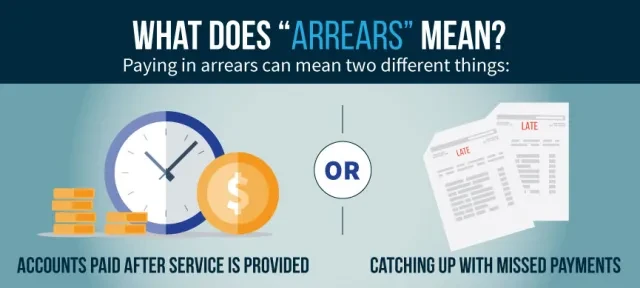- Finanzas
- Artículo
- Lectura de 6 minutos
- Last Updated: 03/15/2018
What Does it Mean to Be "Paid in Arrears?"

Table of Contents
You may have come across the term "paid in arrears" when managing your small-business accounting, but do you know what it means? You should. Understanding arrears accounting is important so that you have an idea of how such payments are applied in transactions.
What Does it Mean to Pay in Arrears?
There are two common meanings associated with arrears accounting. The two ways to define arrears are:
- Payment in arrears can refer to the practice of compensating a service provider after the terms of the agreement has been met. This use of arrears accounting indicates that payment will be made at the end of a certain period, rather than in advance. The same terms apply to arrears payroll.
- Arrears can also refer to the fact that a business is behind on payments. In this case, the arrears amount is considered as accruing from the due date of the first missed payment. When an account is paid in arrears in this usage, each subsequent payment is applied to the oldest payment until the account is "caught up."
It’s good to understand both of these uses of arrears in accounting, so that you know how to apply them to your own business situation.
Accounts Paid After Service is Provide
Arrears accounting can be useful as it provides you with a way to better manage cash flow for your small business. Rather than paying for inventory or services on delivery, you can choose to institute a policy of paying on a delayed basis. Perhaps you pay on a "net 30" or a "net 45" basis; this means that you will:
- pay within 30 or 45 days of receiving the invoice;
- or after receiving delivery (depending on your policy).
Having the ability to pay at the end of a certain period after receiving the deliverables provides you with time to receive payment from those that owe you money, time to make more sales, or even time to secure financing. Arrears accounting provides you with what you need now while allowing you breathing space to meet your obligations later.
What is the meaning of arrears in payroll?
Arrears payroll is the cadence of running the past week’s payroll instead of the current week, or any kind of delayed payroll schedule. The alternative to this would be “current pay”, in which employers pay their employee the day the pay week ends. This means an employer would need to submit an employees’ time before the they even finish their work week.
Put it like this: there's a lot that goes into running payroll for a small business. You must consider federal and state tax withholdings, payroll taxes, benefits deductions (like health insurance and retirement accounts), and other items. In order to manage all of these responsibilities, businesses typically pay employees in arrears; if a check date is every other Friday, employees are actually paid for the previous pay period, rather than the current pay period.
There are many benefits of arrears payroll, some of them being:
- Accuracy of hours. If you’re rushing to get all your employees’ hours in the day the pay period stops, they might even be still working those hours as you’re processing them. You might be able to prevent a rush that may cause stress and inaccuracy if you administer arrears payroll.
- It evens out quickly. Once you’ve gotten into the cadence of arrears payroll, your employees will most likely not notice that the previous week’s hours are next week’s payroll.
Pro tip: if your employees’ hours vary widely week to week, be sure to let your them know that their wages are administered in arrear payroll format, and it will reflect on their paychecks. - It is easier on small business owners. When you’re running a small business, administering “current pay” may be hard to predict: employees may call off of work out-of-the-blue, and then your payroll submitted is incorrect. Arrears payroll helps prevent this issue and frees up your precious time.
Arrears payroll also means if that an hourly employee doesn’t work the designated amount of hours per week to qualify for voluntary deductions, that amount will come out of their next paycheck.
Catching Up with Missed Payments
Sometimes, missed payments result from mistakes. An invoice might be missed, or an automatic payment might not have gone through. A business can find itself in arrears even if subsequent payments are on time. Whether you have missed a payment or one of your clients has missed a payment, it's a good idea to have a policy for what happens when an account is “in arrears.”
Take this situation as an example:
- You pay January and February, but March is missed through an oversight.
- Then, in April and May, payments are made as usual.
- The April payment would have been applied to March and the May payment applied to April.
Your business would be in arrears since March because that's when the payment was missed. In order to bring the account up to speed, you might need to make an extra payment.
Tips for paying in arrears
As a small-business owner, being caught in arrears pay may be difficult, whether it’s what you need to pay, or what others need to pay you. Here are some pointers on preventing or helping the process of being paid in arrears:
- Audit your accounts payable regularly to ensure that you are up to date.
- Keep tabs on organizations that pay you — a business that is constantly in arrears is throwing up red flags, and it could mean that soon you won't receive payment at all.
- When a client or partner is too far in arrears, consider suspending your business arrangement until the account is current to avoid putting your business at risk.
Tags









